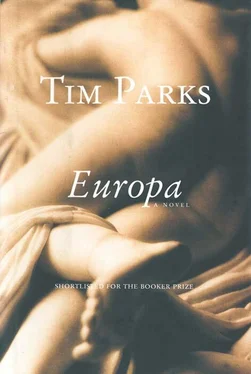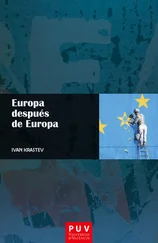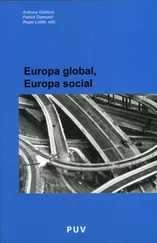We are lost, I reflect, this is the truth about my colleagues and myself in this coach, we are lost in this foreign country that isn’t ours, this Europe that may or may not exist, and we wouldn’t know what to do if we had to go home. To a man, a woman, we are scared of going home, because most of us are forty and beyond and trapped in this place where life once deposited us, this backwater where autumn leaves circle slowly as they rot, and the unmarried women amongst us are scared of losing their one pillar of security, their state salaries and later of course their pensions, and the married women with families are scared of losing their one outlet from their claustrophobic domestic lives, and everybody is scared, I tell myself, as Vikram Griffiths talks on and on, scratching his sideburns, then his dog’s ears, of the loss of identity that would be involved in not being able to say, I work for the University, this is my reason for being where I am, in this foreign country, and not at home in Paris or Athens or Cologne or Dublin or Bruges or Madrid, though most of us frankly have forgotten what home was like. When it suits us we idealize home, I reflect, and again when it suits us we demonize it, and we say we could never have gone on living under Thatcher or under Kohl, or with our parents, or near our ex-wives, or in the intellectual climate in Greece or in Glasgow. Vikram Griffiths doesn’t say to these thoughtless, though for the most part charming students, that many of us dream of returning home, but with someone we love, from a position of strength (as they say), as I was obsessed for a long time by the idea of returning to England with her , and she I believe, or so she told me, by the idea of returning to Rheims with me, and indeed we did return there, to Rheims, or at least it was a return for her, and that was a week of such love, such pleasure, as I shall never forget, though she became restless towards the end, complaining how cold her city was and how provincial and narrow-minded its people. She would rather have been in Paris, she said. We must go to Paris together next trip. But we never went to Paris, we never will go to Paris, and it is quite ridiculous, I tell myself, that you are thinking about all this now with Vikram announcing that we shall be stopping shortly for people to pee and announcing that he will be arranging for us all to go for a dinner tonight in Strasbourg, and that rooms in the hotel are double, with two single beds that is, although beds can always be put together, can they not? Ha ha. Even if there is always the risk of someone falling down the gap in the middle at an embarrassing moment, and hence we should choose our partners now without delay or shame , ha ha, and he produces his theatrical wink, exactly the same as I got in the corridor when he told me that Georg had christened our coach The Shag Wagon , and frankly I must admit that it hadn’t occurred to me I would have to sleep with somebody else. Who shall I sleep with? Who shall I ever sleep with?
Freud ironized when people superstitiously ascribed meaning to the casual repetition of a number or a word, when they wanted the contingent world to mean and be more in their regard than it possibly could, or were afraid that that might be the case, afraid of some conspiracy between psyche and everything other. So that when I read Das Unheimliche in the ridiculous period when I supposed myself an interesting subject for analysis, I imagined that perhaps like me Freud suffered from the opposite problem, that the more some word or number or name was repeated the less it began to mean, the less anything means. Far from being portentous, the words dissolve to mere sound. Hence, for example, if I never say her name, although I think of little else but her, it is partly because that name is still so powerful that its very articulation causes an emotional seizure, an immediate tension that I feel physically, but also and perhaps more importantly, because by never saying it I keep it that way, I prolong its power, I prevent its dilution in repetition, the way a word like Europe has been diluted into thin air with all the times everybody says Europe this and Euro that, though once it was the name of a girl a god became a bull to rape and half the heroes hoped to find.
In any event it then turned out, when she gave me his, I mean Freud’s, biography to read during that, as I said, self-analytic, euphoric, and above all infantile wallowing that was the first splendid year of our relationship — it then turned out that Freud himself, though he never publicly admitted it, had become fascinated by the repetition in his life of the number 62 — on a coathanger, on a hotel key — so that he began to believe he must die at that age. And sitting slightly right of centre in the back seat of this coach, having successfully kept my head down and options open throughout the frenetic discussion when everybody was trying to get the bedfellow they wanted, or perhaps trying not to get the bedfellow they didn’t want, or alternatively insisting that they have a private room so that they could then introduce into it, should the occasion arise, the bedfellow of their choice, I’m surprised when the wide-eyed girl in front suddenly turns to ask all of us behind to guess what our seat numbers are without turning to look at the plastic tags on the headrests, to guess the number and to scribble it down on a piece of paper. And while everybody else is wildly out, I guess, with a sudden perception of its obviousness, 45, which is my age of course, as 045, I see, when I write the number down on the back of this morning’s café receipt, is the phone code for Verona, where she lived until so recently. Four five. I remember Freud, and it occurs to me, as these things unfortunately will, that perhaps I am going to die this year or even this week, for tomorrow will be the fourth of the fifth. Though Freud did not die at sixty-two.
How did you guess? the girl asks, and she is doing that business of cocking her face to one side again, bouncing slightly on her knees, rocking, so that her head bobs up and down above the back of her seat.
I just felt the number 45 come to my mind, I explain. Then not wanting, from sheer vanity, to say it was my age, nor to appear ridiculous by speaking of intimations of mortality, I surprise myself by adding and at the same time in a way discovering: Perhaps it’s because I live at number 45, Via Porta Ticinese. From the corner of my eye I can see Georg smiling wryly, and naturally he thinks I looked at the number tag some while ago and am lying now, and rather pathetically in order to get the girl’s attention, whereas in fact I am telling her the truth to get her attention. For I did have this intuition, there’s a part of me is genuinely alarmed. I do live at 45 Via Porta Ticinese and no longer at number 7 Via delle Rose as for so many years. The number 45, I tell myself, did simply come to you, invaded your mind, uninvited. That’s frightening. Which then reminds me — but I wonder if there is anything now that will not remind me — that all in all this is not so unlike the way I drew her attention when first we met. I mean, I told her, as now, the truth about something which wasn’t really explicable, an intuition that invited ridicule, but that proved to be an important discovery for me. I said — and in the sudden awkwardness and intimacy that can come with the closing of lift doors I was trying to explain my lack of enthusiasm for a job that I had had for years but to which she had only just been appointed and was excited about — I said I somehow felt that the University and indeed the whole city of Milan had been a kind of trap for me, a kind of spell, and that what’s more I had the feeling, insistently, that there was another place where I was meant to be, or perhaps a whole other life I was meant to be leading, a different destiny.
Читать дальше












